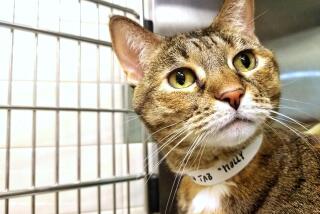Working Out the Kinks in Your Cat
- Share via
Let it never be said that pets don’t get stressed out. Take my cat Jack (and given the giant hairballs he hacks up, I’ve sometimes wished someone would take him). First there was a new home. Next, a cheeky kitten frisked into his life. Then, three weeks ago, came the insult of insults: a puppy. Luckily, Jack doesn’t internalize his emotions, which would be harmful to his heart--he lets us know how he’s feeling by depositing smelly presents on the rug and side-swiping the pup if she lopes too close to his chair.
But surely, I decided, all this must be getting to him. I arranged for him to have a massage.
A few days later, Maryjean Ballner--cat-massage teacher and author of “Cat Massage” (St. Martin’s Griffin, 1997) as well as a cat-massage video--showed up with a bagful of combs, gloves and brushes, and gave Jack a goodly sampling of the more than 50 cat-massage strokes she knows. “Grand effleurage,” “knuckle neck,” “ruffling shuffle”--he got it all, and despite a hiss and a growl or two, there were definitely some “mega-meow moments,” as Ballner refers to them. She didn’t recommend any stroke in particular for hairballs--just regular grooming, she said, as she snipped a well-developed oily mat from his tail.
Owner and cat benefit from cat massage, maintains Ballner, who says she adapted the cat strokes from the human massage she trained in (we doubt if there are too many 41-page student theses on cat massage floating about). Pets and owners get closer, everyone finds it relaxing. And you’ll more readily notice things amiss with your cat, she says. Like oily snarls in tails. (Blush.)
Funny, We Thought It Was Just an Expression
As far as we’re concerned, no question is too trivial to be asked--or properly answered, using the powerful tools of science.
We were delighted a few years back when Japanese scientists decided to find out once and for all whether human beings can walk straight (under normal circumstances, we mean, not late-Friday-night ones). Turns out people veer slightly to the left or right as they stroll, which may explain why unfortunates lost in blizzards wander ‘round in circles.
We were similarly delighted to open up the Sept. 4 issue of the Lancet and see that another scientific team, from the Netherlands, has put that common phrase “weak with laughter” under the scalpel.
What do we mean “weak with laughter”? Do we really get weak when we laugh? Up to 15.5% of us report that we do, according to surveys--plus the phrase has its counterpart in various languages. And it’s true, it seems.
To show this, the scientists told jokes and showed humorous slides to four healthy volunteers. They measured the strength of certain leg muscles when the volunteers laughed out loud and when they didn’t--and found the muscles twitched strongly when the jokes were pathetic and twitched pathetically when the jokes were good. Which explains why people can actually collapse from laughing.
So now we’re wondering: What on earth is the good of subsiding in a heap when you find something funny? And why hasn’t some ferocious wild beast evolved a really comical appearance? And what about all those other colorful phrases people use: “red with anger,” “trembling with fear,” “wide-eyed with amazement”--what’s going on in our bodies to make these phrases true? Watch this space.
Study Puts to Rest Sleeping Suspicion
Finally, we enjoyed reading about that report from another journal--Nature Medicine--in which scientists describe an inherited disorder that messes up people’s biological clocks. Their body clocks run fast. They wake up before they should. Just imagine!
Actually, scientists have long suspected that people’s sleep patterns are influenced by genes--they’ve been studying mutant, early-bird fruit flies and slugabed bread molds for decades. (OK, so bread molds don’t really have to get up in the morning, but they do have to make spores with a regular daily rhythm.)
I’ve suspected it too. When I was a youngster, all the kids in my family slept late (we’re owls), and I can still remember the horror when we visited a “lark” family of our playmates chirping away in the predawn hours, begging us to get up and play with them.
Thank heavens for little genes: My daughter’s an owl as well. For all the good it does. Jack is a lark. The puppy is a lark. And guess what she likes to do first thing in the morning?





